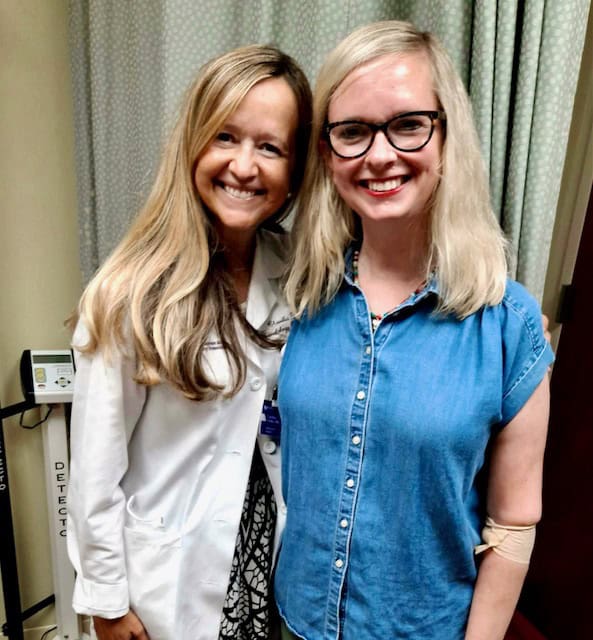
Twenty years after her mother passed away from breast cancer, Colleen Boraca learned she had two conditions that increased her chances of developing breast cancer. She documented her journey with tamoxifen here and advocated for herself through her journey here. Below, she writes about finishing tamoxifen after five years.
September 19, 2024, was a huge day in my life. Although I was preparing for my oldest son’s 17th birthday the next day, what was the main reason for celebration? I took my last of 1,825 pills of tamoxifen.
What is Tamoxifen?
Tamoxifen is a medication used to block estrogen, which is needed for some breast tumors to grow. Many patients are prescribed tamoxifen to lower the risk of having a recurrence of breast cancer, usually after breast cancer surgery, chemotherapy and radiation. Most individuals take tamoxifen for five to 10 years. I was first introduced to tamoxifen 25 years ago when my mother started it after completing radiation. Unfortunately, she still developed metastatic breast cancer (MBC) and died within two years of her MBC diagnosis.
My path to tamoxifen was a little non-traditional. Shortly after my first mammogram in 2019, I had a mass removed from my left breast, and the biopsy showed that I had two conditions which increase one’s chances of developing breast cancer: lobular carcinoma in situ (LCIS) and atypical ductal hyperplasia. These conditions, combined with my family history, made me a candidate to take tamoxifen preemptively for five years to reduce my risk of developing breast cancer by about 50%.
Five Years
The decision to take tamoxifen for five years was an easy one, although there are many things I learned along the way. In retrospect, I had an emotional reaction to taking this medication. Tamoxifen did not prevent my mother from dying. When I started taking it, I looked at each pill and wondered whether it would lead to a brighter future for me, helping me be around for the life milestones that my mother missed. Five years is a long time, so taking it eventually became part of my regular routine without much additional thought.
What Helped Me
Many things have helped get me through the last five years. Talking with others who were also taking tamoxifen was a key source of support for me. I connected via Facebook with many warriors who were facing similar side effects and figuring out how to balance them with the demands of raising children, jobs, caring for aging parents and managing all of life’s challenges. They taught me that sometimes switching the manufacturers of tamoxifen can reduce side effects, encouraged each of us to ask our oncologists about adjusting dosages and brainstormed creative ways to manage side effects.
For example, one person suggested drinking pickle juice to help with my joint and muscle stiffness. While I was never brave enough to try this and opted for suggestions that would not make me gag, I appreciated the help. All of it. It is a community that celebrates when people finish their stints and mourns when others do not avoid recurrences. While there are many negative aspects of social media, this group helped me thrive. Of course, I always knew to run suggestions by my oncologist first.
Side Effects
I did not expect to experience side effects coming off tamoxifen, but it makes sense that I did since my body had become accustomed to it for five years. For a few weeks, I was dizzy and constantly tired. I slept better while taking tamoxifen. My understanding is that it will take approximately three months for tamoxifen to totally leave my system. Even when I hit the three months, I hope to maintain some of the positive changes that happened over the past five years, such as exercising every day, including little sugar and alcohol in my diet, and losing twenty pounds.
My first pill was taken on my son’s 12th birthday, the last pill the night before he turned 17. I would do it all again in a heartbeat. Although my risk is reduced, it is far from zero. I will continue to be closely monitored.
Gratitude
For now, I am filled with gratitude. Gratitude that I have proactive physicians, Drs. Claudia Tellez (pictured with me) and Nora Hansen of Northwestern Medicine in Chicago, who move mountains to help their patients. Gratitude that I have insurance that paid for the tamoxifen and all the monitoring that went with it and gratitude for all those who helped me along the way. Gratitude that, hopefully, this medication will help me and all those warriors who also take it, live to see all of life’s most important moments. Peace out, tamoxifen.
Statements and opinions expressed are that of the individual and do not express the views or opinions of Susan G. Komen. This information is being provided for educational purposes only and is not to be construed as medical advice. Persons with breast cancer should consult their healthcare provider with specific questions or concerns about their treatment.



